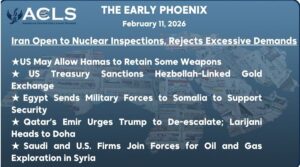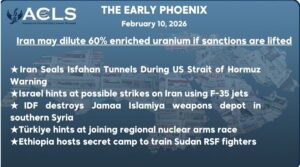The Region October 23-2023
USA In The Region
Analysis: The U.S. is recalibrating its Middle East strategy, as evidenced by the 26th Marine Expeditionary Unit’s diversion to Israel and a bipartisan Senate delegation’s regional tour. The Marine unit, known for rapid deployment and high-impact capabilities, enhances U.S. readiness against potential threats, particularly from Iran. This aligns with the Pentagon’s activation of regional air defense systems. On the legislative front, the Senate delegation, led by Lindsey Graham, emphasized a unified U.S. approach to complex regional issues, meeting key players like Saudi Crown Prince Mohammed bin Salman and Israeli officials. Both military and legislative actions signify a shift in U.S. foreign policy, focusing on rapid response capabilities and a unified political stance. These moves could deter potential aggressors like Iran, while opening avenues for diplomatic negotiations. However, the effectiveness of these strategies will depend on the evolving geopolitical landscape.
Intercepts:
- Elite 26th Marine Corps Unit Diverts to Israel: An Overview of Their Versatile Capabilities. The compact U.S. Marine force, known for its adaptability in military missions, possesses swift deployment and high-impact capabilities, enhancing U.S. strategic presence in volatile regions. While complementing broader U.S. efforts, its primary strength lies in rapid initial responses. Analysts highlight the 26th MEU’s course change from Kuwait to Israel as a significant shift in U.S. regional strategy, capable of showcasing a swift American response to potential threats from Iran and its proxies against Israel. Watch the Fox News video translated to Arabic by ACLS. Additionally, the Pentagon has activated air defense systems across the Middle East in response to recent actions by Iran and its proxies. US Secretary of Defense Lloyd Austin stated that the move aims to enhance regional deterrence and protect US and Israeli interests. The decision follows consultations with President Biden and Israeli Defense Minister Yoav Gallant.
- U.S. Senate Delegation Visits Middle East Amid Rising Tensions. The U.S. Senate delegation led by Lindsey Graham was bipartisan, featuring lawmakers from both the Republican and Democratic parties. Among those who made the trip were Senators Richard Blumenthal, Cory Booker, Katie Britt, Ben Cardin, Susan Collins, Chris Coons, Jack Reed, Dan Sullivan, and John Thune. This diverse group aimed to present a united front from the U.S., emphasizing bipartisan support for engagement in the Middle East. The delegation’s composition underscores the importance that the U.S. places on a unified approach to complex regional issues, including the ongoing conflict in Gaza. In Saudi Arabia, U.S. Senator Lindsey Graham and bipartisan officials met Crown Prince Mohammed bin Salman to discuss U.S.-Saudi ties and the Gaza conflict. The Crown Prince emphasized the need for Gaza de-escalation and restarting the peace process. In Israel, Senator Graham accused Iran of involvement in recent Hamas attacks and warned of consequences if the conflict escalates. He stressed the immediate goal of defeating Hamas for Israel’s security and Palestinian well-being, crucial for normalizing Israel-Saudi relations and regional peace (Al Arabiya, Israel Hayom).
======================================
The Region October 23-2023
ISRAEL & PALESTINIAN TERRITORIES
Analysis: Israel is confronting escalating tensions on multiple fronts, with Hamas in Gaza, Hezbollah in Lebanon, and Assad in Syria—all under the proxy control of Iran. The situation is further complicated by international calls for humanitarian aid and the formation of specialized Israeli units targeting elite Hamas commandos.The recent attack on Israeli troops near the Gaza border has led to increased airstrikes in northern Gaza and preparations for a ground offensive. This escalation has been met with reciprocal rocket attacks from Hamas, straining Israel’s Iron Dome defense system. Concurrently, Israeli Economy Minister Nir Barkat’s warning about a potential military strike on Iran if Hezbollah joins the conflict indicates Israel’s willingness to broaden its military engagements. Israel’s formation of a special operations unit, “Indigo,” aimed at neutralizing elite Hamas commandos, underscores a tactical shift towards targeted operations. Meanwhile, the Al-Qassam Brigades’ evolving naval capabilities pose another layer of security concerns. International calls for humanitarian aid and conflict resolution, led by figures like Pope Francis, add diplomatic pressure. On one hand, Israel is dealing with the urgency of deterring internal security risks; on the other, it faces constant international pressure for humanitarian aid and a ceasefire. Reports suggest that the Biden administration is advising Israel to delay a ground incursion into Gaza, potentially causing internal political rifts between Prime Minister Netanyahu and his war cabinet. This volatile, escalating situation, with Iran having multiple fronts from which to attack Israel, underscores the necessity of a strong American presence in the region. The people of Israel have never needed the United States as much as they do today.
Intercepts:
- Soldier Killed, Tensions Rise in Gaza as Israel Reacts to Hamas Attack. A soldier was killed and three injured as Hamas attacked Israeli troops near the Gaza border. This incident occurred during Israel’s efforts to search for missing Israelis and prepare for an upcoming ground offensive. Israeli forces have increased airstrikes in northern Gaza in preparation for the offensive. In response, Hamas continues to launch rockets at Israeli cities. Additionally, Israel accidentally fired a tank shell at an Egyptian border post, causing minor injuries. Humanitarian aid to Gaza remains a contentious issue, with Israel demanding the release of hostages before allowing fuel into the enclave (Times of Israel).
- He threatened to cut off the “head of the snake”… Israeli Minister: We will destroy Iran if Hezbollah joins the war. Israeli Economy Minister Nir Barkat warned of a potential military attack on Iran if Hezbollah initiates a war against Israel. He emphasized that Israel would not limit its response to Hezbollah but would also target Iran directly. Barkat stated, “If our enemies attack us, we will eliminate them. The ayatollahs in Iran will not sleep peacefully at night, and we will make sure that they will pay a heavy price if they open the northern front (Al Jazeera).
- Pope Francis Pleads for End to Hamas-Israel Conflict and Urges Humanitarian Aid for Gaza. Pope Francis called for an end to the Hamas-Israeli conflict, emphasizing the destructive nature of war and the need for human fraternity. He urged the opening of spaces for humanitarian aid delivery and the release of hostages. The ongoing conflict, which began with a Hamas attack into Israel, has led to significant casualties and a growing humanitarian crisis in Gaza (Khaleej UAE).
- Israeli Raids Continue in Gaza, Al-Qassam Launches Rockets Toward Israel. Israeli airstrikes persist in Gaza, causing casualties and straining medical resources in the Sheikh Radwan neighborhood. The Al-Qassam Brigades respond with rocket attacks on Ashkelon, while the Israeli army intensifies artillery shelling in northern Gaza. The death toll surpasses 400 in a single day of Israeli raids, with growing calls for aid to enter the besieged Strip. Israel maintains its siege on Gaza and prepares for a possible ground invasion, aiming to eliminate Hamas control, despite international concerns about an escalating conflict (Al Hadath).
- Al-Qassam Brigades Retaliate with Rocket Attacks on Ashkelon. In response to renewed Israeli air raids on Gaza, the Al-Qassam Brigades launched a series of rocket attacks targeting Ashkelon. At least 20 missiles were fired, some successfully bypassing Israel’s Iron Dome defense system. The escalation marks a continuation of hostilities in the region (Al Hadath).
- Israel Forms Special Unit to Target Elite Hamas Commandos. Israel’s intelligence agencies, Mossad and Shin Bet, have established a special operations center aimed at eliminating members of an elite Hamas unit responsible for a major attack on October 7. The unit, named “Indigo,” is tasked with tracking down and neutralizing key figures in the Hamas commando unit that led the attack, which resulted in significant civilian casualties and hostages taken to Gaza. Israel warns that top Hamas leaders are primary targets, while Hamas remains defiant (Times of Israel).
- Arab Media Chronicles Al-Qassam Brigades’ Naval Operations: Key Milestones and Impact. Arab media sources provide a detailed account of the Al-Qassam Brigades’ evolving naval capabilities, tracing back to their first naval attack in 2000 against an Israeli gunboat. The report emphasizes key operations, most notably the 2014 storming of the Zikim military base, which marked the first operational appearance of the Brigades’ frogmen units. Israel’s countermeasures, such as the construction of a sea wall in 2018 and advanced sensing systems, are also discussed. The article culminates with a 2023 operation where the Brigades reportedly took control of multiple military sites and settlements in the Gaza envelope. This operation is portrayed as a significant breach of Israeli defense systems, challenging the effectiveness of Israel’s countermeasures (Al Jazeera).
===================================
The Region October 23-2023



